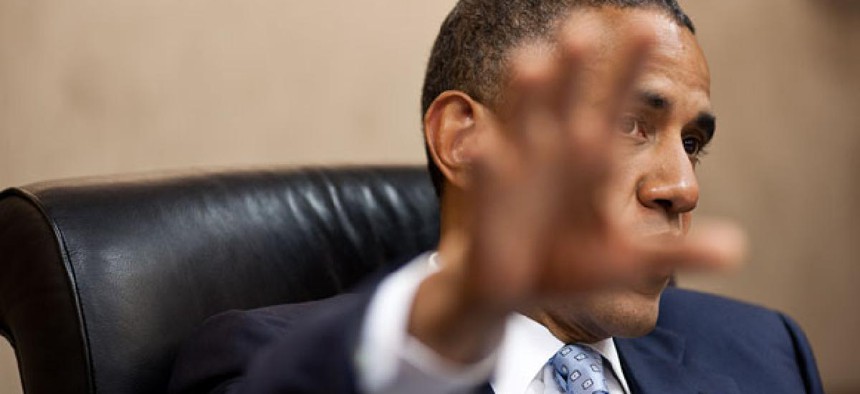
White House photo
Obama, Backed Into a Corner
The president's reelection campaign has little choice but to try to discredit Mitt Romney and hope that voters find him unpalatable.
Any day now, the Supreme Court will announce its decision on President Obama’s health care law. Regardless of the ruling’s details, look for over-caffeinated pundits on radio and television talk shows to immediately declare that it is the most important development to date in the 2012 presidential campaign. As such, the ruling will dislodge the equally supremely important Wisconsin gubernatorial recall election, which had replaced the issue of same-sex marriage, which had replaced the “war on women” and the issue of health insurance coverage of contraceptives.
Not having ever officially joined the pundits’ union, I failed to get the billfold-size membership card with the rules on the back, specifying that at least once every six weeks I am required to identify an earth-shattering event that will undeniably change the direction of the presidential campaign.
Sure, the Supreme Court’s decision, whatever it will be, will dominate news coverage for a few weeks—until the next big development comes along. The key thing to remember is that for their own reasons, neither President Obama nor Mitt Romney wants to spend a lot of time talking about health care reform. By the time fall comes around, the health care issue will be the dog that doesn’t bark.
It’s pretty clear that in the absence of an unanticipated and cataclysmic event, foreign or domestic, this election is going to be about the economy. The room doesn’t have enough oxygen to sustain any other issue for more than a few days.
It’s also pretty clear that the economy is very anemic. Chances are slim that it will rebound much in the four-plus months between now and Election Day. The 56 top economists surveyed earlier this month by Blue Chip Economic Indicators forecast the economy registering just a 2.1 increase in gross domestic product in the second quarter. This growth rate is a bare improvement over the 1.9 percent in the first quarter, with 2.2 percent and 2.4 percent GDP growth rates projected for the third and fourth quarters of this year. Suffice it to say that a growth rate below 3 percent is not good news for a president seeking reelection. The Blue Chip forecast for unemployment is 8.2 percent for the current quarter, 8.1 percent for the third, and 8.0 percent for the fourth quarter.
More worrisome is that there are far more reasons why the economy might do worse than expected rather than better. The global economic slowdown appears to be worsening. It even affects China, India, and Brazil, the troika of real worldwide economic powerhouses in recent years. The banking and sovereign-debt crisis in Europe (which, it should be noted, is in a recession) could very likely spill over and slow the U.S. economy down. And all of this is aside from the year-end “fiscal cliff,” when a wide variety of huge tax cuts expire and large mandatory spending cuts come due unless Congress can devise an alternative course of action. Economists agree that going off that fiscal cliff would likely slice between 3.5 and 4.5 points from GDP growth and tip the U.S. into a new recession. That prospect alone could easily be enough to spook businesses into delaying hiring, expanding, borrowing, and lending. The private sector is in a fetal position, anticipating a second recession. This isn’t a pretty sight.
Election Day is still months away. The race will undoubtedly have a lot of peaks and valleys for each candidate between now and then. But it is increasingly probable that if this election is a referendum on the economy and President Obama’s handling of it, he will lose, notwithstanding the lousy shape it was in when he took office. Because the president doesn’t want the election to be a referendum on the economy, his campaign will try to discredit Romney as an alternative. The Obama camp will have to make the prospect of a President Romney so unpalatable that voters will not want to entrust the Oval Office to him. Obama’s supporters will need to persuade voters that it’s better to put up with what they have than take a risk with Romney.
Obama’s team faces a second challenge: Even as the undecided bloc of voters looks exceedingly inhospitable to reelecting the president, enthusiasm within the Democratic base, outside of the African-American community, is largely nonexistent. Polling data clearly show that Republicans, conservatives, and tea partiers are more motivated this year than Democrats, liberals, and what remains of the Occupy movement. Among the key groups for Democrats—young and Latino voters—enthusiasm is very, very low.
This campaign is far from over, but it is clear which side has the uphill climb.
NEXT STORY: The right has found their leaker






